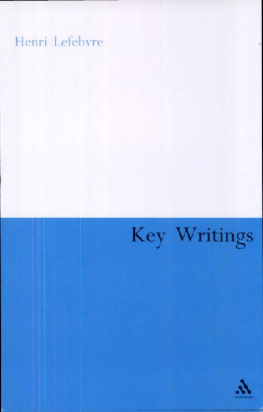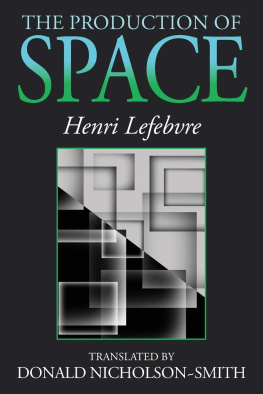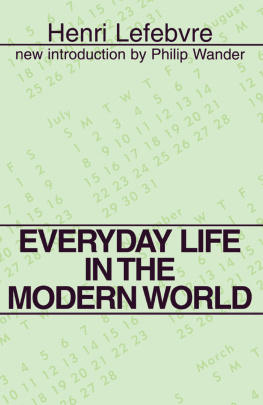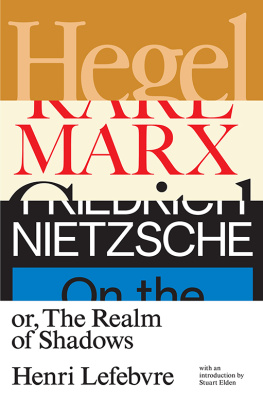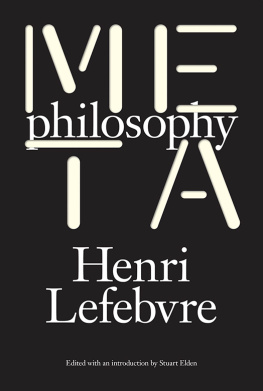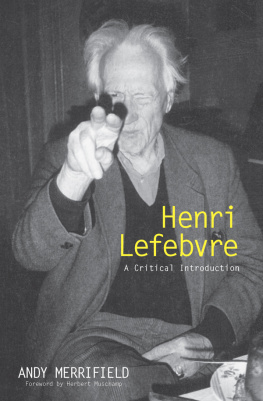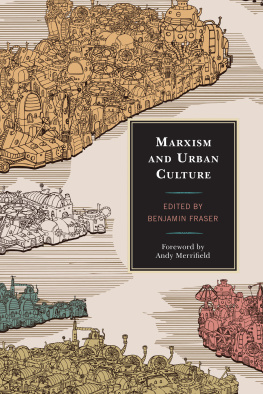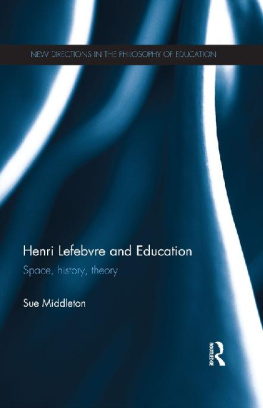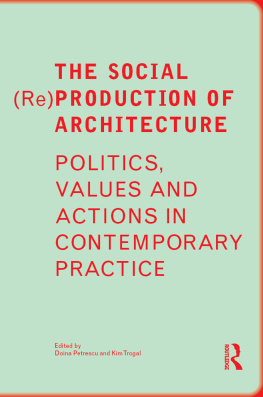Contents
Key Writings
SELECTED TITLES IN THE BLOOMSBURY REVELATIONS SERIES
The Sexual Politics of Meat , Carol J. Adams
Aesthetic Theory, Theodor W. Adorno
Being and Event , Alain Badiou
The Language of Fashion , Roland Barthes
The Intelligence of Evil , Jean Baudrillard
Key Writings , Henri Bergson
Intensive Science and Virtual Philosophy , Manuel DeLanda
Anti-Oedipus, Gilles Deleuze
Difference and Repetition, Gilles Deleuze
A Thousand Plateaus , Gilles Deleuze and Flix Guattari
Origins of Analytical Philosophy , Michael Dummett
Marxs Concept of Man , Erich Fromm
Truth and Method , Hans Georg Gadamer
All Men Are Brothers , Mohandas K. Gandhi
Violence and the Sacred , Ren Girard
The Essence of Truth , Martin Heidegger
Eclipse of Reason , Max Horkheimer
Rhythmanalysis , Henri Lefebvre
Libidinal Economy , Jean-Franois Lyotard
Time for Revolution , Antonio Negri
The Politics of Aesthetics , Jacques Rancire
Course in General Linguistics , Ferdinand de Saussure
What is Art? , Leo Tolstoy
Interrogating the Real , Slavoj iek
Some titles are not available in North America.
Key Writings
Henri Lefebvre
Edited by Stuart Elden, Elizabeth Lebas and
Eleonore Kofman
Bloomsbury Academic
An imprint of Bloomsbury Publishing Plc

Contents
The full sources of the extracts are as follows:
Marxism and Philosophy
Retrospections, LExistentialisme (Paris: ditions Sagittaire, 1946), pp. 5566; new edn (Paris: Anthropos, 2001), pp. 4050; Unity of the Doctrine, Dialectical Materialism, tr. John Sturrock (London: Jonathan Cape, 1968), pp. 10013; Prolegomenas, Mtaphilosophie: Prolgomnes (Paris: Les Editions de Minuit, 1965), pp. 719; new edn (Paris: Syllepse, 2000), pp. 2332; Marxian Thought and Sociology, The Sociology of Marx, tr. Norbert Guterman (Harmondsworth: Penguin, 1968), pp. 1424; Beyond Structuralism, Au-del du structuralisme (Paris: Anthropos, 1971), pp. 205; Hegel, Marx, Nietzsche, Hegel, Marx, Nietzsche ou le royaume des ombres (Paris: Casterman, 1975), pp. 912, 4652; Triads and Dyads, La Prsence et labsence (Paris: Casterman, 1980), pp. 143, 22531; Twelve Theses on Logic and Dialectic, Logique formelle, logique dialectique, 3e edn (Paris: Terraines ditions Sociales, 1982), pp. 38; State, Le Retour de la dialectique (Paris: ditions Sociales, 1986), pp. 1721; Becoming and the Historical, Le Retour de la dialectique (Paris: ditions Sociales, 1986), pp. 402.
Everyday Life
Mystification: Notes for a Critique of Everyday Life, Henri Lefebvre and Norbert Guterman, Avant Poste, 2 (1933), pp. 91107; Elucidations, Critique de la vie quotidienne II: Fondements dune sociologie de la quotidiennet (Paris: LArche, 1961), pp. 748; The Social Text, Critique de la vie quotidienne II: Fondements dune sociologie de la quotidiennet (Paris: LArche, 1961), pp. 30612; The End of Modernity?, Critique de la vie quotidienne III: De la modernit au modernisme (Pour une mtaphilosophie du quotidienne) (Paris: LArche, 1981), pp. 502; On Vulgarity, Critique de la vie quotidienne III: De la modernit au modernisme (Pour une mtaphilosophie du quotidienne) (Paris: LArche, 1981), pp. 748; Myths in Everyday Life, Cahiers Internationaux de Sociologie (vol. XXXIII; Paris, PUF, 1962).
The Country and the City
Perspectives on Rural Sociology, Cahiers Internationaux de Sociologie, XIV (1953), pp. 2240; repr. in Du Rural lurbain, 3e dn (Paris: Anthropos, 2001), pp. 6378; Prface in Henri Raymond, Marie-Genevive Raymond, Nicole Haumont and M. Coornaert, LHabitat pavillonnaire (Paris: ditions du C.R.U., 1966), pp. 313, 1423; repr. as Introduction ltude de lhabitat pavillonnaire in Du Rural lurbain, 3e dn (Paris: Anthropos, 2001), pp. 15970, 17180; Levels and Dimensions, La Rvolution urbaine (Paris: Gallimard, 1970), pp. 10510, 11338; The Other Parises, Espaces et Socits, 13/14 (Octobre 1974Janvier 1975), pp. 18590, 192.
History, Time and Space
The Inventory, La Somme et le reste (Paris: Mridiens Klincksieck, 1989 [1959]), pp. 64255; The End of History, La Fin de lhistoire (Paris: ditions de Minuit, 1970), pp. 1901, 1956, 2002, 2056, 21113, 21516, 2259; 2e dn (Paris: Anthropos, 2001), pp. 1623, 1678, 1724, 1767, 1823, 1856, 1937; The Style of the Commune, La Proclamation de la commune: 26 mars 1871 (Paris: Gallimard, 1965), pp. 203; The Rhythmanalytical Project, Henri Lefebvre and Catherine Rgulier, Communications, 41 (1985), pp. 1919; The Worldwide Experience, De lEtat Vol. IV: les contradictions de ltat moderne (Paris: Collection 10/18, Union Gnrale dditions, 1978), pp. 41322, 43541; Preface to the New Edition, La Production de lespace, 3e dn (Paris: Anthropos, 1986), pp. ixii; repr. in La Production de lespace, 4e dn (Paris: Anthropos, 2000), pp. xviixxviii.
Politics
Nation and Culture, Norbert Guterman and Henri Lefebvre, La Conscience mystifie (Paris: Syllepse, 1999 [1936]), pp. 8191; Between Yourself and You, Norbert Guterman and Henri Lefebvre, La Conscience mystifie (Paris: Syllepse, 1999 [1936]), pp. 1456; Being a Communist, La Somme et le reste (Paris: Mridiens Klincksieck, 1989 [1959]), pp. 68392; From the Social Pact to the Contract of Citizenship, Du Contrat de citoyennet (Paris: Syllepse, 1990), pp. 1737; Some Questions About Asking Questions, M: Marxisme, Mensuel, Mouvement, 7 (Janvier 1987), pp. 54.
The publishers and editors have made all possible efforts to trace copyright holders for the pieces included here. In the event that any have been overlooked, the publishers would welcome being informed, and will make full acknowledgement in the next edition.
The editors wish to express their deep gratitude to Imogen Forster, who made the translations of the majority of the selections. Although we have carefully edited and revised these, in order to provide terminological and stylistic consistency, and therefore take full responsibility for them, we are indebted to her. We are also extremely grateful to Tristan Palmer, our editor at Continuum, for his patience and assistance, and to our colleagues and friends who have helped with some of the more arcane footnote problems.
The editors and publishers have made every effort to contact all copyright holders of material excerpted in this book. The publishers will be happy to correct any omissions in further editions.
What does it mean to come to terms with a thinker? How do we understand the way in which their works interrelate, comprehend the influences on their thought and make a judgement about the validity and applicability of their ideas? What does it mean to reappropriate a thinker, to move them into a different context in time and space, to read them in another language? How does their thought travel; how can their ideas be deployed in new situations; what is living and dead in their thought? For Lefebvre, these questions seem particularly important. While books with titles such as The New Nietzsche, The New Spinoza and The New Bergson appear, it would be hard to imagine one entitled The New Lefebvre. Although this book appears twelve years after his death and two years after his centenary, Lefebvre is still a thinker who is known in a very narrow way in the English speaking world, who remains to be discovered, rather than rediscovered.
Henri Lefebvre, who was born in 1901 and died a few days after his ninetieth birthday, Indeed, the entirety of his writings have yet to be catalogued and published.
Only a small proportion of Lefebvres writings are available in English translation. There was a brief flurry of interest in the late 1960s and early 1970s, when four of his books were translated: Dialectical Materialism, The Sociology of Marx, The Explosion: Marxism and the French Upheaval and Everyday Life in the Modern World. Interest in Lefebvre sharpened at this point, with appropriations and commentary in a range of fields, particularly in those disciplines largely bereft of Marxist analyses in the 1980s and early 1990s, such as geography, architecture and cultural studies.

